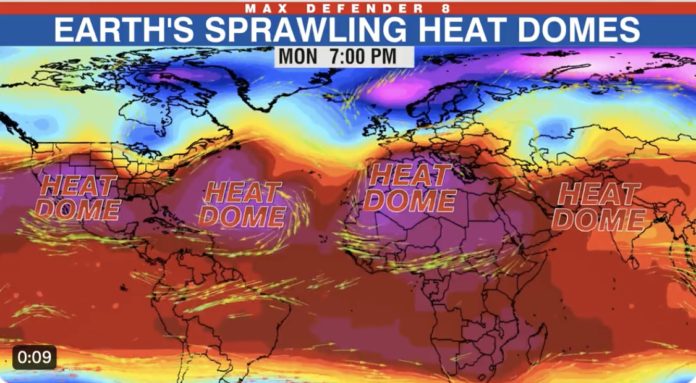Why has there been an apparently sudden outbreak of fatal wildfires in Greece and Hawaii? Numerous other places have been similarly affected but over-shadowed in the news by the most prominent examples. Though there have always been fierce forest fires, they are definitely becoming more frequent and harder to control, and made worse by climate change.
Man-made climate change has been evolving since the start of the industrial revolution some 260 years ago, gathering pace over time, so the current nasty turn of events is not entirely surprising. James Hansen, one of the pioneering climate scientists, warned the US Senate in 1988 that he was: “99% certain global warming is affecting our planet now”. He also correctly predicted that it would be difficult to convince politicians and the public to react. Action since then has been woefully slow to develop momentum.
One little-discussed reason for the increased pace of climate change is the cumulative effect of feedbacks. Climate change feedback loops are complex processes in which an external factor, such as the release of heat-trapping greenhouse gases into the atmosphere, causes a change in part of the climate system that feeds back and amplifies itself. Climate scientists know of at least 15 feedback loops (more are suspected), of which a handful are most significant. Some of these feedbacks support climate change – others mask it.
The most important positive feedbacks are: (1) increased water vapour in the atmosphere enhancing the greenhouse effect, (2) reduced reflection of sunlight (caused by loss of snow cover and ice shelf melt), and (3) melting of permafrost releasing vast amounts of methane into the air. All are initiated by global warming and then amplify that effect.
The most important negative feedbacks are: (1) plants and the oceans absorb carbon-dioxide from the air, (2) a warmed earth radiates more infrared (heat) energy into space, (3) increased cloudiness reflects away more incoming solar radiation. All are initiated by global warming but act to mitigate that effect.
For many decades the man-made increase in CO2 was relatively small and its consequent effects minor, but it’s concentration is now approximately 50% greater than at the start of the industrial revolution. While CO2still constitutes only 0.04% of the atmosphere, it plays a pivotal role in regulating the atmosphere’s temperature. It is transparent to visible (incoming) sunlight but absorbs infrared (outgoing) radiation, trapping that heat and warming the surface and lower atmosphere.
The negative feedbacks largely mitigated the positive feedbacks at first, so the change in temperature was minor and very slow. But negative feedbacks have now been overtaken by positive feedbacks so the increases in the temperature of the atmosphere and the oceans are accelerating, and expected to progressively worsen.
One climate feedback in particular is causing alarm. Over recent decades, driven by earlier warming, the permafrost, which occupies over 10% of all land and roughly two-thirds of Russia, is beginning to break up. If it was all to melt it would release huge quantities of methane which is 25 times more effective at trapping heat than CO2. With temperatures in the affected regions already 3 degrees above historic readings, the collapse of permafrost is now seen as irreversible, though likely to take many decades.
Some say all this is inevitable and we should simply give up and learn to adapt rather than expend vast amounts of money trying to slow or stop climate change. Hawaii warns us that in the face of run-away climate change this is simply not a viable option. Do we really want to try living during an extinction-level event? Consider Venus as an extreme example of a planet with a high CO2 atmosphere which has an unlivable temperature of 464Co – hot enough to melt lead.
For many years the negative feedbacks have slowed or mitigated climate change, but now things have sped up so much there is real urgency for action to curb our emissions. Although some are very wary of the recently announced Blackrock renewable energy fund, I think it has merit. In order to get anywhere near the Government’s announced target of fully sustainable electricity generation by mid-century will require far more investment than New Zealand sources alone can cover. Estimates run to about $40 billion over the next decade, so Blackrock’s offer of $2 billion will be a useful start but is hardly a case of New Zealand putting all its eggs in one basket, or putting outside investors in charge.
Blackrock is not offering to buy or take over our existing energy infrastructure, but will be able to finance new renewable energy systems. But they are a business so this will come at a price. We do indeed need to be cautious about the detailed fine print of the arrangement but it seems a deal worth considering.
Graeme Easte is a retired councillor who studied climate science at Auckland University many years ago and has closely followed its development ever since.





Graeme – Great science, and nicely written…the article would have been strengthen if you outline the impact the Nord Stream terrorist attack by NATO, has had on the Climate
Thanks Nathan – been trying to raise topic of feedbacks for nearly 20 years but Herald has refused all my letters or opinion pieces. I did not have room to include everything in an 800 word essay – but not sure that any single event such as the pipeline sabotage is of major significance anyway.
Graeme – cool
At a time when the world needs more independent scientists, science and independence is under the most attack!
What an Audacious Hoax Reveals About Academia
Three scholars wrote 20 fake papers using fashionable jargon to argue for ridiculous conclusions.
https://www.theatlantic.com/ideas/archive/2018/10/new-sokal-hoax/572212/
Politicians have plenty of time and money and time to change the law for bizarre fringe causes that seem to somehow become out of control and dominate the media and attention, but not much interest in really pushing real science. It’s got so bad now, that scientists are making up studies as hoaxes to show how compromised this approach is to science research.
In NZ under Mātauranga Māori pushed through by political groups, identity politics is becoming as important in academic research than talent. AKA move to make 50% of all research funded in NZ is for Maori and Pacific Islanders and that they are not allowed to be challenged by other scientists. Many pushing
Mātauranga Māori are not Maori, pushing false claims, and actually Maori academics are not allowed to speak out against it. https://www.kiwiblog.co.nz/2022/03/media_council_finds_wiles_column_breach_of_press_standards.html
Not just NZ, scientists around the world are now writing ‘joke’ research papers as above, showing just how compromised formally respected science publications are – media has become woke, journos stupid and seem to want to print anything ‘fashionable’ without fact checking.
Well, when we concentrate on weather events as heavily as we now do, we are going to get the desired feedback that those who have pushed us in this direction desire. This is the feedback that matters (to them). But when we look at weather from a historical point of view, thousands upon thousands of years, of which science has the ability to do, then we see a whole other story.
the real problem is pollution, but surprise, surprise, we are not doing anything about it. heck, we barely concentrate on it, and we are certainly not pushed to want to do anything about it.
So, what is the difference here? Simple, one circumstance here is a money maker for them while the other costs money to them. And who is them…I’d like to think that is obvious, certainly one of them has gotten a mention here and as this piece somewhat alludes to – this is business!
Woke identity politics distractions taking over human rights from real issues like climate destruction.
Left nut jobs taking over human rights commissions and other nutters now deemed trans activists pushing through their own personal woke human rights litigation.
Trans activist Jessica Yaniv filed genital wax complaints as means of ‘extortion,’ rights tribunal rules
The ruling orders Yaniv to pay $6,000 in costs to three of her targets for ‘improper conduct’ including using human rights law as a ‘weapon’ for ‘extortion’
https://nationalpost.com/news/trans-activist-jessica-yaniv-filed-genital-wax-complaints-as-means-of-extortion-rights-tribunal-rules?ref=quillette.com
So millions of people, flora and fauna are dying in fires, floods and other climate disasters, but formally environmental parties like NZ Greens are more motivated to blindly fight for trans activists and woke identity worries, and that seems to be a main focus politically.
Meanwhile in Scotland political party SNP, turned woke party are being arrested and questioned as money has disappeared. https://news.sky.com/story/why-have-senior-snp-executives-been-arrested-and-what-are-police-investigating-12859963
SNP were funded and supported to make Scotland independent but failed on that one, but did get gender self ID through https://www.thetimes.co.uk/article/labour-is-desperately-backtracking-from-this-self-id-mess-jf2phnw5s,
botched the census https://www.scottishdailyexpress.co.uk/news/politics/hundreds-take-part-gender-critical-27753863
and fucked up the rental market https://propertyindustryeye.com/uk-faces-chronic-shortage-of-rental-homes-alarming-new-data-shows/
Wonder who SNP remind us of?
(I wonder if they imported over 100,000 potential new migrant renters to contribute to the housing shortages like the bright sparks here in NZ have?)
I must admit, I’ve been using lots of Qtol lately, with this tropical weather we’ve been getting down south….BBQ’s on the deck each night and hydrating with Speights….keeping up the fluids….I’ve been able to move my indoor plants outside now , and it’s freed up some room inside for a shelf for my record collection….swings and roundabouts I say…..
Graeme Easte wrote “We do indeed need to be cautious about the detailed fine print of the arrangement but it seems a deal worth considering.”
But it is rather difficult for us, as members of the public, to “consider” this deal when we are left entirely in the dark as to what the deal is all about.
What we do know is that BlackRock is proposing to invest in renewables, specifically solar and wind power. Both methods of generation suffer from the problem that they cannot supply continuously. Therefore, in the periods when they are generating they need to be assured of a high price per unit supplied. They cannot risk being undercut at those crucial times by suppliers capable of continuous generation, such as hydro, geothermal and gas or coal fired plants.
In short, before investing BlackRock needs an assurance that New Zealand electricity prices will remain consistently high, and to that end it would appear that government has given BlackRock an assurance that generating capacity in New Zealand will lag behind demand for electricity or that government will institute a mechanism to impose minimum price levels for electricity.
Clearly there will be consequences for New Zealand electricity consumers who will be paying through the nose to guarantee BlackRock’s profits from an inherently risky venture, yet the public have been led to believe that this deal will amount to nothing more than an increase in electricity generation capacity, which would normally, other things being equal, lead to reduction in price. This kind of political deceit is no way to re-build public trust in government, which trust is a necessary condition of any serious measures to confront and avert climate change.
“This kind of political deceit is no way to re-build public trust in government, which trust is a necessary condition of any serious measures to confront and avert climate change.”
Well said, but with the media on their side, very few people are able to spot deceitful government action. And building trust is just a matter of leaning on the government mouthpieces, aka the mainstream media. Meanwhile, the billionaire class makes hay at our expense as you have very astutely noted. This is today’s world, pity there’s not a lot more people like yourself around.